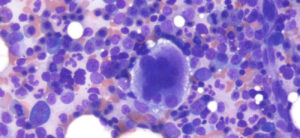 A Myelodysplastic Syndrome (MDS) is one of a group of cancers in which immature blood cells in the bone marrow do not mature, and as a result, do not develop into healthy blood cells. Some types may develop into acute myeloid leukemia.
A Myelodysplastic Syndrome (MDS) is one of a group of cancers in which immature blood cells in the bone marrow do not mature, and as a result, do not develop into healthy blood cells. Some types may develop into acute myeloid leukemia.
Risk factors include previous chemotherapy or radiation therapy, exposure to certain chemicals such as tobacco smoke, pesticides, and benzene, and exposure to heavy metals such as mercury or lead. Problems with blood cell formation result in some combination of low red blood cell, platelet, and white blood cell counts. Some types of MDS cause an increase in the production of immature blood cells (called blasts) in the bone marrow or blood.
Treatments may include supportive care, drug therapy, and hematopoietic stem cell transplantation. Allogeneic hematopoietic stem cell transplantation (HSCT) is a potentially curative treatment for patients with myelodysplastic syndrome (MDS). Both the intensity of conditioning regimens and the graft-versus-leukemia immune effects are important determinants of its efficacy.
The prognosis depends on the type of cells affected, the number of blasts in the bone marrow or blood, and the changes present in the chromosomes of the affected cells. The average survival time following diagnosis is 2.5 years.
